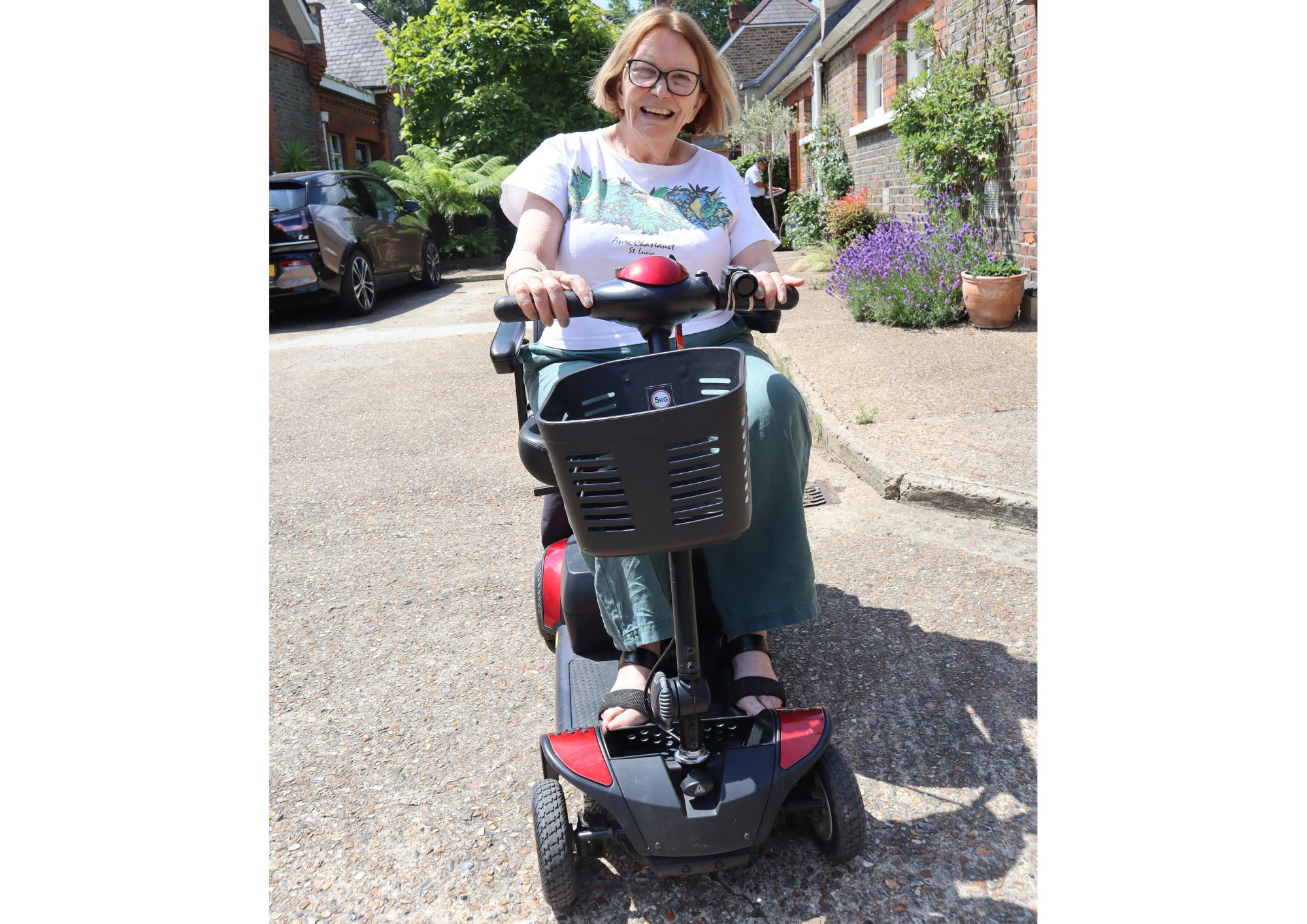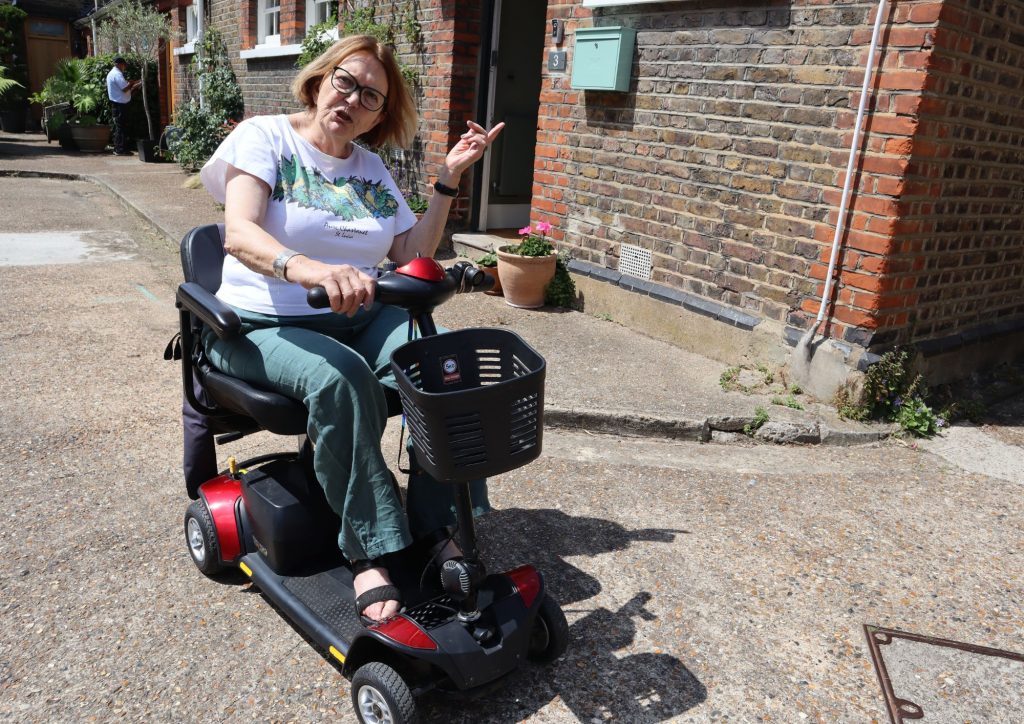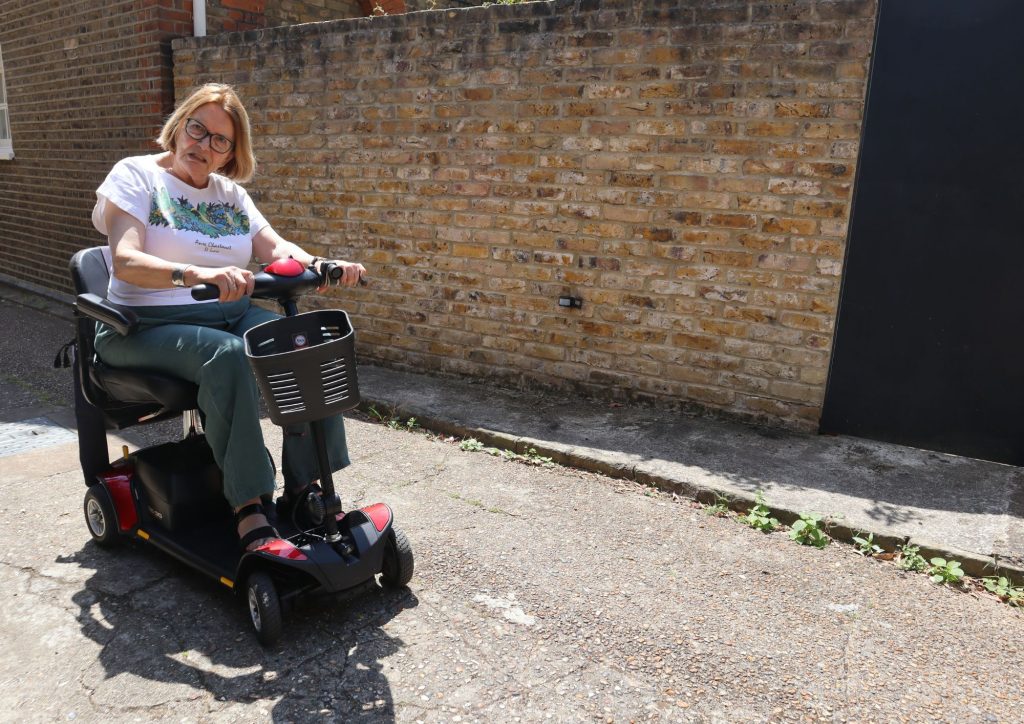Baroness Joan Bakewell’s kerb appeal for people in mobility scooters and wheelchairs
‘You don’t realise how important these things are until you need them’
Monday, 23rd June 2025 — By Tom Foot

Baroness Joan Bakewell on her wheels
BROADCAST legend Baroness Joan Bakewell is calling on the council to introduce more “dropped kerbs” to help people with mobility scooters, wheelchairs and baby buggies.
The retired journalist and Labour peer – now 92 – said she was regularly frustrated on her mobility scooter by steep pavement-edges near her home in Primrose Hill “and Camden generally”.
Dropped or raised kerbs can be applied for via the council but there is a high cost and red tape bureaucracy to cut through.
“For someone who is 92 and depends on their scooter, this is very important,” Baroness Bakewell told the New Journal. “So I’m making this plea for people like me. But it is also important for mums with push chairs. And disabled people. It’s quite simple, we need more dropped-kerbs.”
Baroness Bakewell became a household name as one of the strongest women’s voices of her generation at the BBC and has lived in Primrose Hill since the 1950s.
She said she parked the scooter outside her home and that charging it could be an ordeal for someone in their nineties.
“I can just about do it but I have to get on my hands and knees at the door to charge it up,” she added.
“Scooters are charged at the ankle height. Why don’t they design them so you can charge them at waist height?
“The scooter itself is a wonderful little thing because of the freedom it gives me. I went to something called London Mobility. I went to their warehouse in Willesden. I went up and down in several, and this was the one.

“When you are my age, life is quite small. I don’t have a career of any kind anymore, and I don’t expect to walk anymore, I mean I’m 92. I am still a Labour peer and I go to Parliament in a taxi, but only if there is a three line whip.
“Really all you need at this age are local shops and places to meet your chums. The library is very important to me and I like to go in and see what leaflets they have about the elderly, and to see what books are new and what my friends are writing and so on.
“I am reading three books at any one time, one is a Russian comedy by Andrey Kurkov. You’ve heard of Death And The Penguin of course? He wrote that. It’s an easy read.”
Baroness Bakewell has a garden which is accessed from a slip road – but again this is blocked by a steep kerb.
“People come to tea, they go and sit in my garden. But I can’t get into it because there is no dropped-down kerb,” she said.
“When I go to Sam’s Cafe I have to go right up onto the road, and then force myself up the pavement. It’s crazy really, it’s quite dangerous.
“Nobody really thinks thinks about these things until you are in need of them.”
She added: “I am perfectly healthy. I have lots of friends and family. This little enclave is full of people who keep an eye on you. We have the occasional drink. It’s very civilised.”
Baroness Bakewell has contacted Camden Council about installing kerbs by her garden.

Dropped kerbs, also known as “crossovers” are usually installed to allow vehicles access to off-street parking.
Residents can apply to get dropped-down kerbs installed outside their homes through the planning system.
The recent pedestrianisation of Camden High Street was criticised for failing to have dropped-down kerbs – mounds of tarmac have been installed this week – as a temporary fix.
Mik Scarlett, disabled activist in Camden, said “There should be a dropped kerb at every junction and crossing point. “For anyone new to getting around on wheels it always comes as a shock how inaccessible everything is and crossing the road is a big issue.
“There are no safety issues as to why there aren’t dropped kerbs anywhere, but there might be some preservation issues. I loathe this as an excuse, especially as Historic England insists on every listed area being accessible unless it has a 1* status.
“Primrose Hill has quite a few access issues, but everywhere could do with better pavements and crossing points.”
Councillor Adam Harrison, Camden’s environment chief, said: “We introduce dropped kerbs on an ad hoc basis where residents point out problems.
“As part of our wider plans, we also make sure distances are shorter to cross.
“The council is rolling out ‘continuous crossings’ at junctions with main roads, which keep the walking level raised to the same as the pavement, allowing pedestrians to cross more easily.
“These changes ultimately benefit everyone living in or visiting the borough and I look forward to working with our residents to make Camden the most walking- and wheeling-friendly borough in the country.
“We encourage anyone with suggestions to improve accessibility on our streets, or anyone who has experienced any issues, to get in touch with our Safer Travel team so we can address this.”